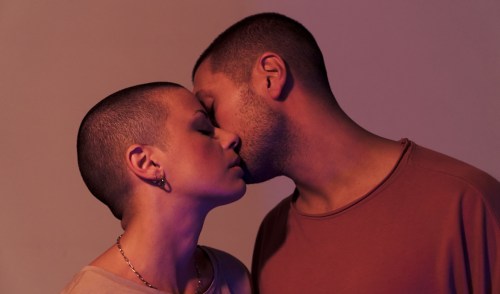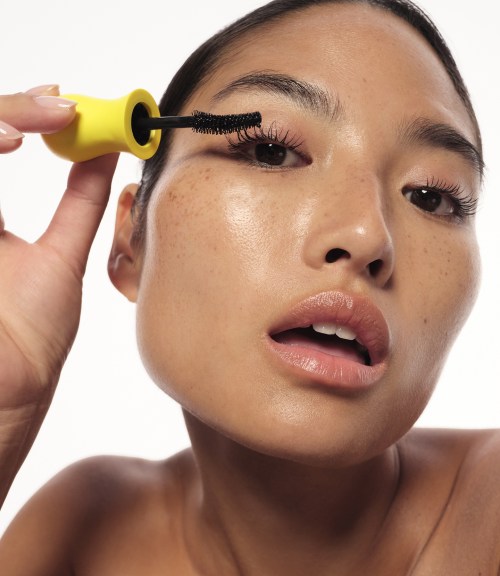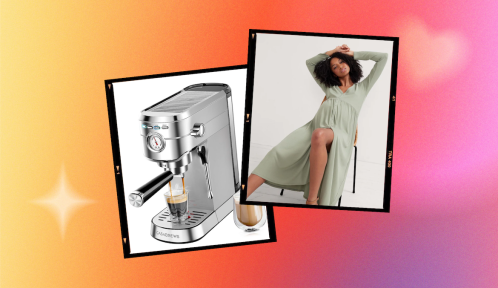Saying “I love you” out loud to another person for the first time can be downright terrifying. Words are powerful, and those three little words in particular hold plenty of weight—especially if you’re brave enough to be the first one in the relationship to say it. Even when it feels “right” to say it out loud for the first time, questions of self-doubt can bloom: What if they don’t say it back? What if it makes the relationship awkward? How soon is too soon to say “I love you”?
Experts in This Article
licensed marriage and family therapist in Philadelphia
author and co-host of the Spiritually Hungry podcast
licensed marriage and family therapist
certified sex educator, author of The Game of Desire, and sex and relationships expert for K-Y and Bumble
Even if you and your boo have already expressed your love physically, verbalizing your feelings can change the entire dynamic of your relationship. “These words signify a move toward a new, deeper level of commitment for couples,” says Deirdre Cosgrove, LMFT, clinical director at A Better Life Therapy. “I believe they mean so much because these words are vulnerable to say.”
“I’m a big romantic, so I think if you are feeling you love someone, it’s always good to express that feeling; however, it’s likely going to be more of an emotional risk the earlier you say it into the relationship.” —Deirdre Cosgrove, LMFT
It can be confusing to know the right time to say those three little words, especially if you haven’t been in love before and are experiencing feelings that are totally new to you. To help you navigate this, we tapped relationship experts to explain just how soon is too soon to say I love you, plus how to know when it’s the right time to pop the sentiment.
How fast is too soon to say I love you?
It depends on the person and the situation (there’s no one right way to date or love someone!) but typically, experts recommend waiting to say “I love you” until at least three months into the relationship.
Why? Well for starters, “love at first sight,” is rarely how love works outside of romantic comedies. “I find that people did not know they loved [a person] truly from the first date, but rather there was a slow growth of love throughout the time they started getting to know each other,” says Omar Ruiz, LMFT, a licensed marriage and family therapist and the owner of TalkThinkThrive.
Early on in a relationship, particularly if things get physical, you might be confusing infatuation with love. That’s understandable—the beginning of a promising new relationship comes with a lot of excitement and desire that can literally change your brain chemistry. “There is something very chemical happening at the earliest stages of a relationship: cortisol levels, dopamine, and all kinds of things are going up and down,” says Monica Berg, a relationship coach, author, and podcaster. It might feel amazing, but that’s not quite the same as being in love or loving someone.
“When we’re in an infatuation stage with somebody, that feeling is not consistent, sort of similar to happiness,” explains Shan Boodram, sex and relationship expert for K-Y. “When we love somebody, that feeling is consistent regardless of the circumstances. Love is an infinite emotion.”
Thankfully, that flurry of “feel good” chemicals (and the infatuation it creates) usually levels out six months into the relationship, says Berg. “At that point, you might start to notice things you didn’t notice before, or feel a little bit differently.” The rose-colored glasses you wearing during the honeymoon stage of your relationship might begin to wane after this period, giving you a clearer picture of your partner and your relationship as a whole. (And if you said “I love you” too soon, you might realize that you made a mistake that will be hard to rectify.)
Saying “I love you” too soon can also apply too much pressure on what was otherwise a fun, new, casual relationship. The other person could feel unnecessarily pressured to say it back, even if they don’t feel the same way, or they might not reciprocate the phrase, causing tension in the relationship. If you think those might be strong potential outcomes of saying it for the first time, that’s a pretty good sign that it’s too soon to say “I love you,” says Berg.
If you feel compelled to say it to achieve something or get something out of the relationship, like a sense of relationship security, or to reach the next big milestone, it’s definitely too soon to be saying it. “It can be risky and it can be ‘too soon’ if there is an agenda behind it that’s not pure,” explains Berg. “A lot of times we say certain things because we want to feel safe and secure, when really, that’s something we should provide for ourselves.”
What you can say instead of I love you
“I love you” might seem like the one-and-only way to express affection for a romantic partner, but that’s simply not the case. “You don’t have to jump to those three words to describe the deep sense of interest and intrigue, or commitment, or fondness for somebody,” says Boodram. “There are different ways that might be more accurate and a little less scary.”
Rather than saying “I love you,” try telling the other person how amazing they make you feel, or how much you admire their unique traits and qualities. One of Boodram’s favorite alternatives to “I love you” is “I want you.” She says it captures your desire for the other person without holding the weight of “I love you,” and might better describe your feelings for them, too.
If you feel that you’re not ready to say “I love you” to your partner, you can show your partner how much you love them through actions. Running an errand for them, caring for them when they’re sick, and giving gifts are all fantastic ways to show, rather than say, how much you love your partner.
Is it a red flag when someone says I love you too soon?
It might be difficult to imagine hearing “I love you” from someone you’re romantically involved with as a bad thing, but relationship experts warn that, in the wrong hands, those words can be used to manipulate someone. “Saying I love you really early on can definitely be a red flag,” says Boodram.
Saying “I love you” too early on in the relationship could be an attempt at love bombing, a manipulation tactic wherein someone showers their romantic partner with affection in order to get something out of them, like sexual favors, to quell their insecurity about the relationship’s status, or to have control over you in the relationship.
If you suspect your partner has said “I love you” for the wrong reasons, Berg suggests listening to your heart and only saying it in return if you truly feel the same way. “If somebody says it to you, and you’re not really comfortable responding in the same way or it doesn’t feel genuine, watch the actions that follow those words,” she advises. If they pressure you to say it back or incessantly drop hints that they’re upset that you didn’t say it back to them, that’s a pretty good indication that they said it with manipulative intent, not to express their love for you. “Look what the actions behind the words are,” adds Berg. “If they feel inconsistent, or they don’t feel true, then trust your gut.”
How long should you date before saying I love you?
Just as there’s no “correct” time frame to have sex with someone for the first time, there’s no “correct” time frame in which couples should say “I love you.” That being said, Cosgrove and Ruiz agree that it’s best to say those three special words once you have spent at least three to five months getting to know your partner.
At this point in the relationship, you’ve likely (and hopefully!) have talked at length about your beliefs, your values, your goals, and future plans you’re looking forward to with your partner. By this point in your relationship, you’ve likely experienced an argument or conflict of some kind as well, that required the two of you to work together in order to move past it. Reaching these relationship milestones can help you determine if your feelings are rooted in love versus infatuation, as well as whether your relationship has the foundation to survive beyond the honeymoon stage.
Again, though, there’s no “right” time to say it; the timing will depend wholly on the dynamics of your relationship and how comfortable you feel with verbally expressing that love for the first time. “I’m a big romantic, so I think if you are feeling you love someone, it’s always good to express that feeling; however, it’s likely going to be more of an emotional risk the earlier you say it into the relationship,” says Cosgrove.
Signs it’s the right time to say I love you
According to Berg, a good indicator of when it’s the right time to say “I love you” lies in how safe you feel about saying it to them. “If you’re feeling the need to say it, you’ve probably developed a relationship where you feel comfortable enough around them that you can be vulnerable,” says Berg. “That’s how you know if you should go to the next stage.”
To better understand whether you should take the next step and say “I love you,” Berg recommends asking yourself these questions:
- How do I feel in my own skin around them?
- Do I feel insecure around them?
- Do we have common goals, values, and beliefs?
- Do we have the same sense of purpose?
- Is this person worthy of receiving my love?
- Will they hold my heart in a safe way?
- If this was the worst day of my life, how would this person show up for me?
If the answers to these questions are overwhelmingly positive, that’s a good sign that you’ve reached a stage of your relationship where saying “I love you” is appropriate.
Another good indicator is the other person’s actions. If they’ve expressed a great amount of appreciation for you through their words, or have shown some of the physical signs of someone falling in love with you, those are two green flags that it’s the right time to say it.
At the end of the day, though, Cosgrove says to trust your gut. “I think if you feel you can’t help yourself from saying it, and it feels like you are about to blurt it out when you are together, that’s how you know it’s time to share your feelings,” says Cosgrove. Gauge how your partner is feeling, too. Consider the time frame and be certain of your feelings before courageously expressing how you feel.
How to say I love you for the first time
In regards to how you should say “I love you” for the first time, reading your partner’s cues, as well as analyzing your emotions to figure out if you’re actually in love or not, will help you decide when and how to say it. But here are some expert tips to help you get through that moment.
1. Ease into it
Before saying those three words, Berg suggests prefacing it in order to avoid surprising the other person. “You can say, ‘I know what I’m about to tell you might spook you, but I want to say it because I feel it,’” she says. Doing this will help prepare them to hear it for the first time and will give you some extra time to build up the courage to say it.
2. Be clear and concise
When telling someone “I love you” for the first time, be clear and don’t mince your words; say it outright. “You should clearly express to somebody what you mean when you say that you love them and what you’re asking from them in return,” adds Boodram. After you’ve told them you love them, take a moment to explain why you love them and how you came to that conclusion—this may help them decide if they’re ready to say it back.
3. Don’t expect them to say it back
If they reciprocate and say “I love you” back, that’s amazing! But you should still prepare for the likelihood that they might not feel ready to say it back, or might not feel the same way toward you.
Boodram suggests telling them that you don’t expect them to immediately say it back, and explain that you’re willing to wait if they need more time to figure out their feelings. “Being told that you’re loved by somebody can be interpreted as additional expectations and responsibilities that you may not feel ready for yet,” she explains. Giving your partner the reassurance that they don’t have to say it back can provide them with the space they need to process what just happened, and hopefully say it to you back at a later time.
What to do when you say “I love you” but don’t hear it back
Don’t freak out (or pull a Dean from Gilmore Girls and dump your partner) if you say “I love you” and they don’t say it back. Yes, it’s probably not the outcome you were hoping for, but it doesn’t mean the relationship is doomed to fail, says Berg.
“Get curious—information is powerful,” she says. “If they don’t want to respond, or they’re not comfortable, it’s really important to know why.” When you understand the reasons why they didn’t say it back, you can decide how to move forward. “It’s a good opportunity for a conversation, to unpack feelings, to be able to hear them express things they might not have told you,” says Berg.
Perhaps they are scared to say it for the first time, even after you’ve said it first. Maybe they assign deeper weight to the phrase “I love you” than you do, or perhaps they were just shocked to hear it for the first time. Maybe they’re afraid of commitment, or have been previously hurt by someone who also expressed love toward them. On the other hand, they simply might not love you back, at which point you’ll be able to decide if it’s time to end the relationship. Whatever the reasons may be, it’s important to know what they are so you and your partner can move forward.
“That extra bit of conversation can go a long way,” agrees Boodram. “With a difficult conversation, the benefit isn’t in the process; it’s in the aftermath.” If immediately diving into a conversation about the lack of reciprocation feels too awkward, try giving them time to sit and reflect on what just happened, she adds. Let them know that you enjoy the time you spend together, and want to continue to foster the emotional intimacy that’s blossoming between the two of you, and give them space to process and decide whether or not they’re ready to say it back.
Sign Up for Our Daily Newsletter
Get all the latest in wellness, trends, food, fitness, beauty, and more delivered right to your inbox.
Got it, you've been added to our email list.











